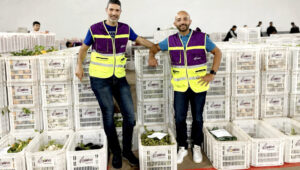India’s population is growing in size and wealth while grappling with pollution and climate stress. This all, in turn, exerts pressure on the subcontinent’s sprawling food systems, which have long been criticized for being too opaque, too complex, too wasteful — and too hard on the millions of smallholder farmers doing their best to feed the nation. As AFN has previously reported, these stresses and strains are boosting the appetites of investors and policymakers for wholesale technology-driven reinventions of India’s food supply chain, all the way from farm to plate.
News of another early-stage investment seeking to make a mark on India’s supply chains came this week from Kisan Network — a startup building out a digital agri produce supply chain. The team has raised a $3 million round led by Atsushi Taira at Mistletoe, with participation from Y Combinator, the Thiel Foundation, Venture Highway, FundersClub, Lynett Capital, Gokul Rajaram, and other angels. It has previously raised a seed round so this is likely a Series A stage deal.
Fathers and sons
“Kisan Network started as my undergrad thesis work at Princeton University before I dropped out and started working on it full time along with my father,” said Aditya Agarwalla, in an emailed exchange with AFN. His father, Sanjay, is a co-founder at Kisan and started Integrated Digital Systems (IDS) back in 1992, a company specializing in the field of Geo-Spatial Analytics (GSA).
“What our asset-light supply chain does,” Agarwalla added, “is that it connects marginal farmers (who form almost all of India’s 100m+ cultivator population) directly to businesses anywhere in the country for the sale of their produce, with each step digitally captured and monitored on our proprietary management portal involving 0% use of paper. In the process, we address the deep-rooted issue of distrust that farmers experience in the existing crop selling process and also help them make more money than in the opaque and fragmented current system. With a farmer strength of more than 50,000 in over 6,000 villages across multiple states in India, we are growing rapidly and are on the cusp of becoming an even larger Pan-India player with hundreds of trucks crisscrossing the country.”
Strong fighting talk. Traditionally, however, India’s food systems have proven too fragmented and complex for any swift moves to more efficient digital marketplaces. Besides, strong local vested interests from millions of middlemen, or mandis as they are known, often actively forestall streamlined, fully transparent supply chains. Yet investors are starting to move into this space in earnest, hopeful that in 2020, with technology moving apace and fresh funds coming in, something has to give. “In India and other small farm holding regions, agriculture has had very little supply chain innovation and is riddled with inefficiencies. The digitization of these chains and what they can do for the future of our food is exciting,” said Ritu Verma, a co-founder of Ankur Capital, a Mumbai-based impact investment firm with a strong emphasis on Indian agri-food tech which announced its first close on $33 million for its second fund this month.
The rise of impact funds like these to deploy across India tallies well with signs of a maturing ecosystem of investments into digital supply chains. Just a few weeks ago, TechnifyBiz — an Indian startup creating a digital B2B marketplace for non-perishable food commodities like nuts, seeds, dry fruits, specialty grains, and honey — raised $2 million in seed funding from Omnivore and the Insitor Impact Asia Fund. TechnifyBiz contrasts sharply with the strategy of another recent Omnivore investment — the digital ag trading platform Bijak, a company proposing to work with India’s middlemen in a bid for greater accountability and transparency.
Both these could eventually dovetail into competition with the likes of the Kisan Network, but for now, there’s still plenty of wiggle room for plenty of other startups too. Elsewhere in the sphere of Indian supply chain innovations, homegrown tech offerings have been maturing nicely — such as Ecozen Solutions, a company developing portable solar-powered food storage solutions. India-based CropIn won Rainforest Alliance’s AgTech Developer Challenge for its AI and satellite-powered cocoa solution. Plantix, meanwhile, a platform that harnesses computer vision to enable the early-stage detection of crop diseases with a smartphone camera, raised a €6.6 million Series A last year bid to transform Indian farming.
DeHaat’s rapidly expanding farmer network provides agricultural inputs, customized crop advising, and market linkages for farm produce, while TheKrishi App is also aiming to boost Indian farmers’ finances by aggregating multiple stakeholders on a digital platform. (Disclaimer: DeHaat is an AgFunder portfolio company.) Ninjacart raised $89 million from Tiger Global in India’s largest-ever farm tech deal, while TartanSense is focusing on building robots to assist small farmers throughout the country with pesticide application and Intello Labs is applying computer vision and deep learning to measure the quality of crops.
In a Medium post set to be published on Thursday and sent to AFN last week, Atsushi Taira, a managing director at Mistletoe Singapore, said his company saw “immense value in Kisan Network’s focus in providing market linkages directly to farmers, and their progress so far in building out each aspect of their tech-enabled supply chain is highly promising. We are excited to partner with them in scaling rapidly to every nook and corner of the country, and empowering farmers to become entrepreneurs by providing various kinds of services through Kisan Network.”
Staying grounded
Elsewhere in the Medium post, which was compiled by the founders of Kisan Network, Sanjay and Aditya Agarwalla were circumspect about having raised the money, saying it would go toward “introducing new farmer-centric products and services to existing farmers on our network.”
“While raising money is sometimes mistaken for success,” they wrote. “We realize the fallacy in doing so. Farmers could not care less about how much we have raised, who we have raised from, how swanky our HQ is or how much we are valued at. Working with them on a daily basis keeps us and the entire team grounded, and rightly so.”
The pair added that a company offsite is set for April at surroundings more regal than agricultural: the Taj Mahal.
Any thoughts on India’s food systems? Let us know at [email protected]














Sponsored
Sponsored post: The innovator’s dilemma: why agbioscience innovation must focus on the farmer first